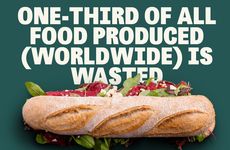
This Commitment-Focused Infographic Asks People to Take Action on World Food Day
Alyson Wyers — October 22, 2014 — Eco
References: eslsolutions & sustainablog.org
This infographic on food waste was in honor of World Food Day last week. From ESL Ecocleen Services, 'The Shocking Impact of Wasting Food' focuses specifically on the United Kingdom but also emphasizes the issue is one of a global nature.
According to the chart, almost 50% of food waste in the UK occurs at home, with fresh potatoes, slices of bread and glasses of milk being the biggest contributors in 2013. While some waste is unavoidable, like chicken bones and egg shells, they can still be composted. The infographic offers facts and tips so people can take action and make a commitment to waste less when 870 million people are hungry. It covers subjects like leftovers, grocery stores, eating out at restaurants and school lunches.
According to the chart, almost 50% of food waste in the UK occurs at home, with fresh potatoes, slices of bread and glasses of milk being the biggest contributors in 2013. While some waste is unavoidable, like chicken bones and egg shells, they can still be composted. The infographic offers facts and tips so people can take action and make a commitment to waste less when 870 million people are hungry. It covers subjects like leftovers, grocery stores, eating out at restaurants and school lunches.
Trend Themes
1. Reducing Food Waste at Home - Opportunity for innovative solutions to help individuals minimize food waste in their own homes, such as smart storage systems or meal planning apps with recipe suggestions for using leftovers.
2. Sustainable Grocery Stores - Potential for grocery stores to implement strategies to decrease food waste, such as selling imperfect produce at a discount or partnering with food banks for donation programs.
3. Efficient School Lunch Programs - Room for improvement in school lunch programs to reduce food waste, such as offering more customizable options for students or implementing composting systems in schools.
Industry Implications
1. Smart Home Technology - Smart storage systems and meal planning apps can be developed to help individuals reduce food waste at home.
2. Retail - Grocery stores can explore innovative strategies to decrease food waste and appeal to environmentally-conscious consumers.
3. Education - Schools can adopt more efficient lunch programs and implement composting systems to educate students on the importance of minimizing food waste.
5.4
Score
Popularity
Activity
Freshness























